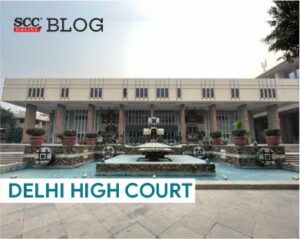Delhi High Court: In an appeal filed by the appellant-plaintiff company challenging an order dated 21-03-2022 passed by the Trial Court whereby, the plaint of the appellants was rejected under Order VII Rule 11(d) of the Civil Procedure Code (CPC) on the ground that the civil suit was barred by virtue of Section 430 of Companies Act, 2013 as the appropriate forum for the adjudication of the disputes involved is the National Company Law Tribunal, Chandra Dhari Singh, J., sets aside the impugned order and held that the trial court has erred in rejecting the plaint as being barred by Order VII Rule 11(d) of CPC inasmuch as the suit was not barred under Section 430 of the Act, 2013.
The plaintiff company held 50.21% equity shares in Tirupati Ceramics Limited (TCL) which was declared as a sick company and proceedings under the Board for Industrial and Financial Reconstruction (BIFR) were pending. An MOU was entered by the plaintiff company with respondent 3 to transfer the said 50.21% equity shares of TCL to Respondent 3 in return of a deposit of Rs. 60 lakhs. Pursuant to this, plaintiff companies delivered the original share certificates along with a Transfer Deed and a condition that Respondent 3 will not lodge the said shares for transfer until the conclusion of the proceedings before the BIFR, thus retaining the ownership with the plaintiff till final disposal before BIFR.
Meanwhile, Mr, Dhoot, erstwhile Chairman of Plaintiff company accepted the offer of Respondent 2 to purchase the shares of TCL and sent letters addressing the same, when he was made aware of the MOU. Mr. Dhoot clarified this to Respondent 2 stating that by mistake the agreement was made, and he does not intend to go further. The original share certificates were demanded by TCL vide email(s) which were refused and rejected to be given to TCL, however, in the meantime, TCL was declared dissolved by NLCT, Chandigarh.
Being aggrieved with the fact that Respondents 1 and 2 were resolute on the issuance of the duplicate share certificates despite the plaintiff companies having entered an MoU with Respondent 3, the plaintiff companies filed a civil suit which was rejected on the ground that the civil suit was barred by virtue of Section 430 of the Companies Act, 2013, National Company Law Tribunal (NCLT) being the appropriate forum. Assailing this order, the present appeal was filed.
Issues
1. How is a bar on the jurisdiction of civil courts to be inferred?
• Whether the facts and circumstances of the present case bar under Section 430 is attracted?
• Does the liquidation of TCL impact the outcome of the instant appeal?
The Court noted that it is a settled proposition of law that the exclusion of the jurisdiction of a civil Court is not to be readily inferred. On a bare perusal of Section 9 CPC, it is clear that in the present case, we are concerned with the exception clause, particularly relating to ‘excepting suits of which their cognizance is either expressly or impliedly barred’.
The Court further noted that a suit is said to be expressly barred when it is barred by any enactment for the time being in force. It is a settled proposition that every presumption should be made in favour of the jurisdiction of a civil Court and the provisions of exclusion of jurisdiction of a Court must be strictly construed.
The Court remarked that if there ever arises any suspicion about the ousting of the jurisdiction of a civil Court, then the Courts are duty bound to lean towards an interpretation which would uphold the jurisdiction of a civil Court. And, if the remedy provided by a statute is not adequate and all questions cannot be decided by a special tribunal, the jurisdiction of a civil court is not barred.
Considering the Statement of Object and Reasons, Scheme and certain provisions of the Companies Act, 2013 which throws light upon the powers and jurisdiction of the NCLT, the Court observed that the bulk of the dispute between the parties pertain to the ownership of the 50.21% shareholding in TCL and the validity of the meeting of the board of directors which is alleged to have taken place on 27-08-2013.
Thus, the Court concluded that, though it appears that the disputes at hand between the parties can be adjudicated by the NCLT, but such a decision would render the Appellants remediless as TCL has been dissolved and is no more in existence. In case the company has been dissolved by the NCLT, there exists no corporate entity which can be proceeded under the Companies Act, 2013 and similarly, there exists no members of such a company. Therefore, such provisions cannot be said to be applicable to the disputed governing TCL.
The Court held that no corporate entity now exists in the form of TCL which may be governed by the provisions of the Companies Act, 2013. Hence, it cannot be said that the suit filed by the plaintiff companies was barred under Section 430 of the Companies Act, 2013.
[Videocon Industries Limited v Ram Raj Bhandari, 2022 SCC OnLine Del 4579, decided on 23-12-2022]
Advocates who appeared in this case :
Mr. Jayant K. Mehta, Sr. Advocate with Mr. Vineet Sinha, Mr. Shaan Taanu G. Tyagi and Ms. Kaveri, Advocates for appellants
Mr. C. Shekhar and Mr. Vibhor Gupta, Advocates for respondents
Arunima Bose, Editorial Assistant has reported this brief.

